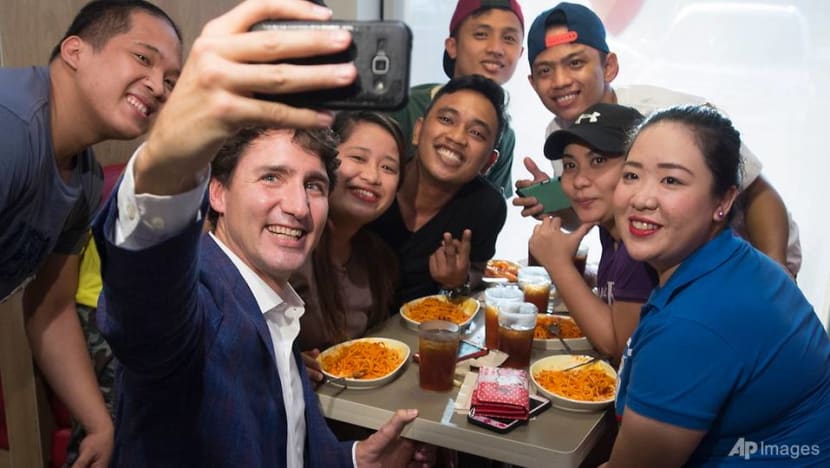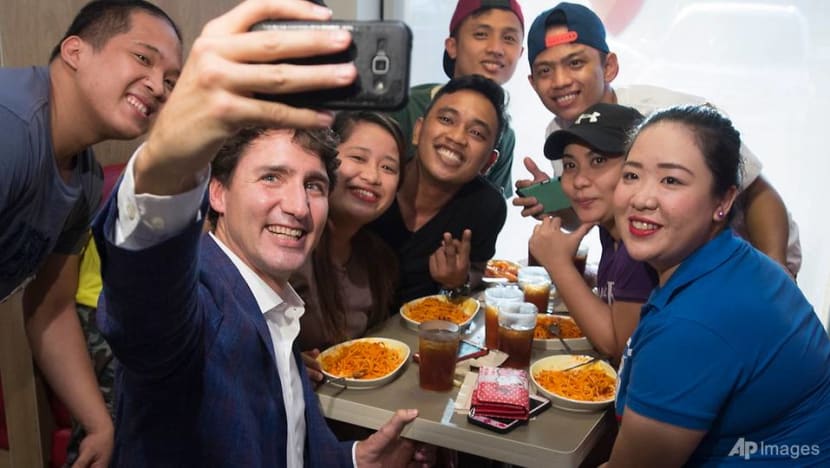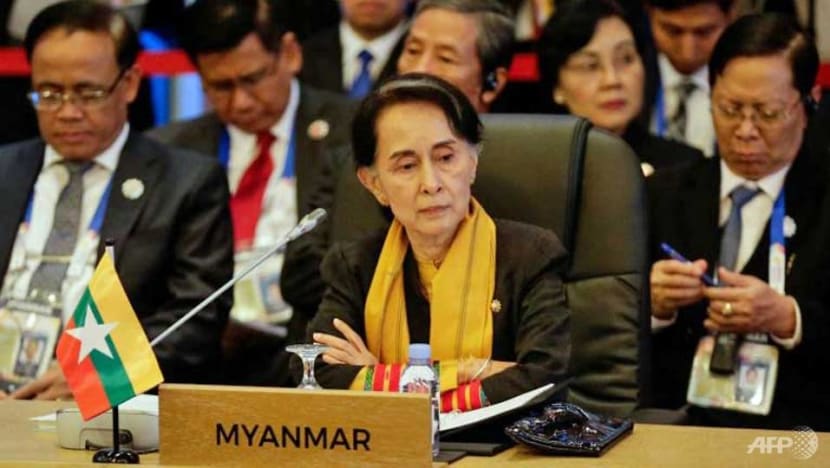commentary Asia
Commentary: How others stole the show from the ASEAN Summit
More media coverage on world leaders like Justin Trudeau and Donald Trump aside, there are deeper reasons why the ASEAN Summit didn't get the attention it should, says Gideon Lasco.

Canadian Prime Minister Justin Trudeau, second left, takes a photo with customers at a fast food restaurant in Manila, Philippines Sunday, on Nov 12, 2017. (Photo: AP/ Adrian Wyld)
MANILA: It may have been the twice yearly ASEAN summit, but much of the attention and focus in the Philippines and all across Asia Pacific was on non-ASEAN personalities and matters.
Naturally, the greatest impact of the summit fell on residents of Metro Manilla.
In the weeks leading up, most residents worried about the ensuing impact on their lives arising from the logistics of the event. Fresh still were the memories of the 2015 APEC summit, when the horrendous traffic jams juxtaposed with empty, exclusive lanes for APEC vehicles frustrated commuters.
This time around, however, the Filipino government took pre-emptive measures of suspending work and school which helped greatly, despite some glitches and traffic jams.
Then there were the street protests against Filipino President Rodrigo Duterte’s war on drugs and US President Donald Trump’s visit - and the controversial use by the police of ear-piercing sonic alarms to break them up.
Reports indicated over 100 people hurt and allegedly accosted by the police in these protests yet these did little to ruin the subsequent positive atmospherics of the summit.
FOREIGN LEADERS STOLE THE SHOW
Of course, ASEAN leaders received media coverage, but the emphasis was on a non-ASEAN leader: Donald Trump.
That the Air Force One passenger would be the centre of attention is understandable: Filipino foreign policy has always revolved around America - its former colonial master.
Animating this relationship last week were instances of Duterte’s bonding with Trump over how much they disliked former US President Barack Obama, and the nice words Duterte had for Trump, a man who had previously praised his drug war. Much to the disappointment of human rights advocates on both sides of the Pacific, there was little or no discussion of human rights or the extrajudicial killings.
Instead, there were much pleasantries - including Duterte singing a song, in his own words, “upon the orders of the commander-in-chief of the United States”.
But it was Canadian Prime Minister Justin Trudeau who really stole the show and hit all the right tunes with regional audiences. Popular to begin with, he captivated Filipinos with his brief stopover to a branch of Jolibee, the nation’s beloved fast food chain.
He also visited Likhaan, a women’s health centre - a gesture well received by reproductive rights advocates. He also highlighted that he had raised the extrajudiciary killings with Duterte, a big boost to Duterte’s critics who have voiced concerns over his war on drugs over the past year.

ASEAN ISSUES LEFT HANGING
What of ASEAN? Of course, there was much more to the summit than the headlines, and the summit’s agenda of trade, cybercrime and terrorism are key challenges that the region has resolved to address.
But many issues were left hanging - or not addressed at all. Even the much touted “consensus” on protecting and promoting migrant workers’ rights is not binding.
Despite China’s aggressive island-building in the South China Sea over the past year, there was no condemnation, let alone mention, of it in the Chairman’s Statement, and it remains to be seen whether the agreement to discuss a code of conduct in South China Sea will change the facts on the ground (or the sea in this case).
While we expect regional issues to dominate the ASEAN Summit’s agenda, a few awkward domestic situations that have gained significant international attention were notably swept under the carpet. The ongoing humanitarian crisis among the Rohingya in Myanmar has left Aung San Suu Kyi, once an icon of democracy and human rights in the region, a tainted figure.

WHITHER ASEAN COMMUNITY?
All of the above notwithstanding, it is no small victory if not relief that the summit took place without a major glitch. Despite his reputation as a loose cannon, Duterte stayed mostly on script. Filipino officials pulled off a professionally run event.
However, the summit was a missed opportunity for the regional organisation to show how it benefits Southeast Asians.
The ASEAN Summit could have shown how its work is relevant to the man on the street, how many Southeast Asian jobs were created or families whose lives have been touched through ASEAN initiatives.
This disconnect may have arisen because Southeast Asians don’t see themselves as one entity that ASEAN impacts, as national identities remain strong, and officials too are embarrassed to make the case.
Indeed, the 2015 vision for an ASEAN Community has a long way to go before it can be realised, not just as a political club of its leaders or an economic platform for business interests - but as a cohesive force that acts for the good of its people.
Dr Gideon Lasco is a political commentator who writes a weekly column for the Philippine Daily Inquirer.














